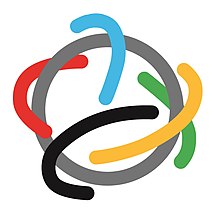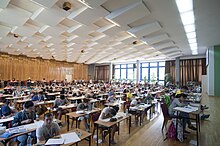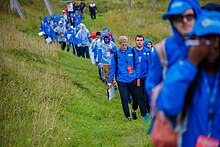International Geography Olympiad







The International Geography Olympiad (iGeo) is an annual competition for 16- to 19-year-old geography students from all over the world. Students chosen to represent their countries are some of the best, chosen from thousands of students who participate enthusiastically in their own National Geography Olympiads. iGeo tests the abilities of every participant in spatial patterns and processes. The iGeo consists of three parts: a written test, a multimedia test and a substantial fieldwork exercise requiring observation, leading to cartographic representation and geographical analysis. The programme also includes poster presentations by teams, cultural exchanges, and time for students to know their fellow students and explore the host city.
The International Geography Olympiad is organised by the International Geographical Union (IGU) Olympiad Task Force, who produce tests with reference to the local organisers and the international board.
After the first iGeo in 1996, it was recommended that the competition was held biennially. Due to the competition growing in popularity, since 2012 the competition has been held annually, rather than biennially, as is the case with the other large International Science Olympiads.
History of competition and national success
During the 1994 Congress of the International Geographical Union (IGU) in Prague, people from Poland and the Netherlands launched the idea of an International Geography Competition (iGeo) or Olympiad for students between 15 and 19 years of age. The first one was held in 1996 in The Hague, Netherlands, with five participating countries. The participant count grew to 24 countries with the 2008 competition in Carthage, Tunisia.
Before 2012, the International Science Olympiads were held every two years, and some regional geography Olympiads were held during intervening years.[1] These include the Asia Pacific Regional Geography Olympiads (APRGO), which were held in 2007 (Hsinchu, Taiwan[2][3]), 2009 (Tsukuba, Japan[4]), and 2011 (Merida, Mexico[5]), and the Central European Regional Geography Olympiads (CERIGEO). Since 2013, the International Geography Olympiad, in concordance with the other Olympiads, has been held on a yearly basis.
Due to the COVID-19 pandemic, the 2020 iGeo in Istanbul, Turkey was postponed.[6] The Olympiad was held in Istanbul between 11 and 15 August the following year, with 46 countries participating.[7] The Olympiad was held online once again in 2022, hosted by Paris. It was the edition with the highest number of countries (54) and participants (209).[8] In 2023, the iGeo returned to a physical format and it was held in Bandung, Indonesia.[9] The next Olympiad is to be held in Dublin, Ireland in 2024.
Member countries and regions
The countries and regions which participated in the 2023 International Geography Olympiad were:[10]
 China-Beijing
China-Beijing China-Hong Kong
China-Hong Kong Macau
Macau Taiwan
Taiwan Croatia
Croatia Cyprus
Cyprus Czechia
Czechia Denmark
Denmark Estonia
Estonia Finland
Finland France
France Hungary
Hungary Indonesia
Indonesia Iran
Iran Ireland (observer)
Ireland (observer) Japan
Japan Kazakhstan
Kazakhstan Latvia
Latvia Lithuania
Lithuania Malaysia
Malaysia Mongolia
Mongolia Montenegro
Montenegro Netherlands
Netherlands Nigeria
Nigeria Philippines
Philippines Poland
Poland Portugal
Portugal Romania
Romania Serbia
Serbia Singapore
Singapore Slovakia
Slovakia Slovenia
Slovenia Switzerland
Switzerland Thailand
Thailand Tunisia
Tunisia United Kingdom
United Kingdom United States
United States
The full list of participating teams for all past iGeos may be found on the iGeo website.
Summary
| Number | Year | Host country | Host city | Individual Olympiad Champion | Best National Team | 2nd National Team | 3rd National Team | Nations | Participants |
|---|---|---|---|---|---|---|---|---|---|
| 1 | 1996 | The Hague | Steven Pattheeuws |
5 | 20 | ||||
| 2 | 1998 | Lisbon | Katarzyna Kwiecińska |
5 | 20 | ||||
| 3 | 2000 | Seoul | Adam Biliski |
13 | 52 | ||||
| 4 | 2002 | Durban | Florin Olteanu |
12 | 48 | ||||
| 5 | 2004 | Gdańsk | Maciej Hermanowicz |
16 | 64 | ||||
| 6 | 2006 | Brisbane | Jacek Próchniak |
23 | 92 | ||||
| 7 | 2008 | Carthage | Barbu Ion Alexandru |
24 | 96 | ||||
| 8 | 2010 | Taipei | Barbu Ion Alexandru |
27 | 108 | ||||
| 9 | 2012 | Cologne | Samuel Chua |
31 | 124 | ||||
| 10 | 2013 | Kyoto | Daniel Wong |
32 | 128 | ||||
| 11 | 2014[11] | Kraków | James Mullen |
36 | 144 | ||||
| 12 | 2015 | Tver | Chang-Chin Wang |
40 | 159 | ||||
| 13 | 2016 | Beijing | Wuttipat Kiratipaisarl |
45 | 173 | ||||
| 14 | 2017 | Belgrade | Victor Vescu |
41 | 160 | ||||
| 15 | 2018 | Quebec City | Alen Kospanov |
43 | 165 | ||||
| 16 | 2019 | Hong Kong | Albert Zhang |
43 | 166 | ||||
| — | 2020 | Postponed for 2021 due to the COVID-19 pandemic | — | — | — | — | — | — | — |
| 17 | 2021 | Istanbul (online) | Rustam Bigildin |
46 | 180 | ||||
| 18 | 2022 | Paris (online) | Sanzhar Khamitov |
54 | 216 | ||||
| 19 | 2023 | Bandung | Passakarn Leewongcharoen |
45 | 177 | ||||
| 20 | 2024 | Dublin | — | — | — | — | — | — | |
| 21 | 2025 | Bangkok | — | — | — | — | — | — | |
| 22 | 2026 | Istanbul | — | — | — | — | — | — |
Performances
Best nations by podium finishes (all time)
| Place | National Team | 1st, 2nd, 3rd | Years Champions (Teams Participating) | Years Runners Up (Teams) | Years 3rd Place (Teams) |
|---|---|---|---|---|---|
| 1st | 7, 1, 1 | 1996 (5), 1998 (5), 2000 (13), 2004 (12), 2006 (23), 2015 (40), 2017 (41) | 2002 (12) | 2012 (31) | |
| 2nd | 5, 3, 2 | 2002 (12), 2008 (24), 2013 (32), 2018 (43), 2023 (45) | 2012 (31), 2015 (40), 2017 (41) | 2006 (23), 2014 (36) | |
| 3rd | 4, 4, 1 | 2010 (27), 2012 (31), 2014 (36), 2022 (54) | 2016 (45), 2018 (43), 2021 (46), 2023 (45) | 2013 (32) | |
| 4th | 1, 2, 1 | 2016 (45) | 2010 (27), 2014 (36) | 2008 (24) | |
| 5th (tied) | 1, 0, 0 | 2021 (46) | — | — | |
| 5th (tied) | 1, 0, 0 | 2019 (43) | — | — | |
| 6th | 0, 3, 0 | — | 2004 (12), 2006 (23), 2008 (24) | — | |
| 7th | 0, 2, 0 | — | 1996 (5), 1998 (5) | — | |
| 8th | 0, 1, 2 | — | 2019 (43) | 2017 (41), 2018 (43) | |
| 9th (tied) | 0, 1, 0 | — | 2022 (54) | — | |
| 9th (tied) | 0, 1, 0 | — | 2013 (32) | — | |
| 9th (tied) | 0, 1, 0 | — | 2000 (13) | — | |
| 10th (tied) | 0, 0, 2 | — | — | 2015 (40), 2022 (54) | |
| 10th (tied) | 0, 0, 2 | — | — | 1996 (5), 1998 (5) | |
| 11th (tied) | 0, 0, 1 | — | — | 2021 (46) | |
| 11th (tied) | 0, 0, 1 | — | — | 2023 (45) | |
| 11th (tied) | 0, 0, 1 | — | — | 2016 (45) | |
| 11th (tied) | 0, 0, 1 | — | — | 2019 (43) | |
| 11th (tied) | 0, 0, 1 | — | — | 2000 (13) | |
| 11th (tied) | 0, 0, 1 | — | — | 2002 (12) |
Most national individual victories (All time)
| Place | Nation | Wins | World Champions Produced (Year) |
|---|---|---|---|
| 1st (tied) | 4 | Jacek Próchniak (2006), Maciej Hermanowicz (2004), Adam Biliski (2000), Katarzyna Kwiecińska (1998) | |
| 1st (tied) | 4 | Victor Vescu (2017), Barbu Ion Alexandru (2010, 2008), Florin Olteanu (2002) | |
| 3rd (tied) | 2 | Daniel Wong (2013), Samuel Chua (2012) | |
| 3rd (tied) | 2 | James Mullen (2014), Albert Zhang (2019) | |
| 3rd (tied) | 2 | Alen Kospanov (2018), Rustam Bigildin (2021) | |
| 3rd (tied) | 2 | Wuttipat Kiratipaisarl (2016), Passakarn Leewongcharoen (2023) | |
| 7th (tied) | 1 | Chang-Chin Wang (2015) | |
| 7th (tied) | 1 | Steven Pattheeuws (1996) | |
| 7th (tied) | 1 | Sanzhar Khamitov (2022) |
References
- ^ "IGU - What is iGeo". www.geoolympiad.org. Retrieved 2021-08-24.
- ^ "International Geography Olympiad". promotinggeog.geo.ntnu.edu.tw. Retrieved 2021-08-24.
- ^ https://spock.nehs.hc.edu.tw/newsletter/1205/B.htm[permanent dead link]
- ^ http://japan-igeo.com/english/pdf/result.pdf [bare URL PDF]
- ^ http://www.gtansw.org.au/files/geog_bulletin/2012/2_GTA%20Bulletin%201%202012-2_Asia%20Pacific%20Olympiad.pdf [bare URL PDF]
- ^ iGeo 2020 - : info@igeo2020.org. "iGeo 2020". iGeo 2020. Retrieved 2020-05-19.
{{cite web}}: CS1 maint: numeric names: authors list (link) - ^ "The 2021 iGeo - Istanbul, Turkey". iGeo 2021. Retrieved 2021-07-04.
- ^ "IGU - iGeo 2022". www.geoolympiad.org. Retrieved 2023-09-08.
- ^ "IGU - iGeo 2023". www.geoolympiad.org. Retrieved 2023-09-08.
- ^ "Information Booklet iGeo 2023". 2023.geoolympiad.id. Retrieved 2023-09-08.
- ^ "iGeo2014 Kraków". web.archive.org. 2016-04-04. Retrieved 2023-12-13.
